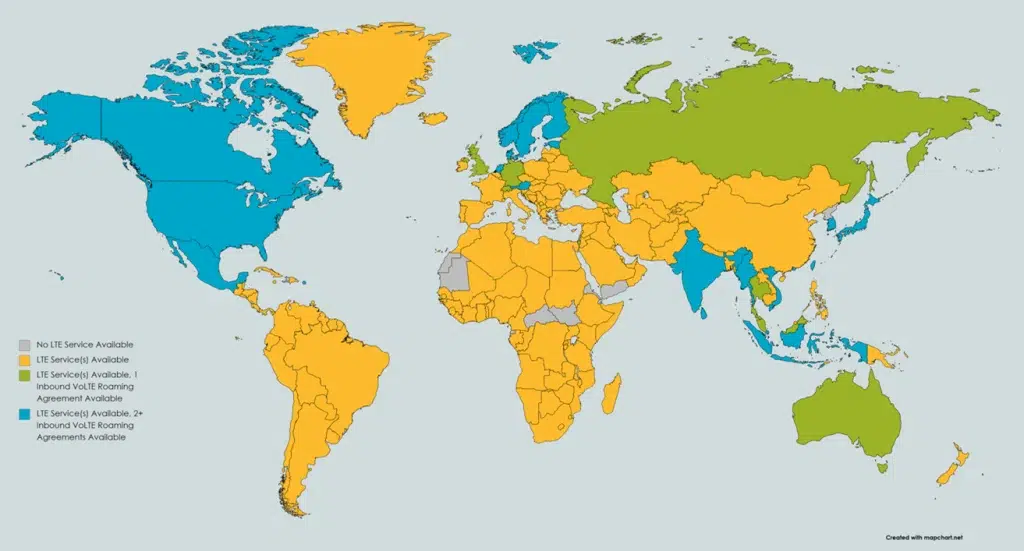Why Telco Companies Should be Thinking about Roaming Testing
- Reading Time: 5 minutes
In the not-so-distant past, a seasoned traveler would do a bunch of research before going on a trip, saving maps to their phone, printing out phone numbers and bookings, and checking if the airport has Wi-Fi availability.
Nowadays, seasoned travelers skip the hassle of planning. Roaming fees have gone down, various data plans are available, and people know they can use roaming to get the information they need.
When senior leadership is planning quality and resource investments, global roaming is a crucial aspect of the customer’s experience to consider.
Why Is Roaming Performance Important?
Whether at home or roaming, your customers deserve the same voice and data performance. However, a random gap in service at home may be quickly forgotten. But sometimes the ability to use apps, maps, and messaging is more critical when you are roaming far from home.
A roaming quality performance study in the EU was led by the JRC (Joint Research Centre). Results showed that speed and performance were consistently worse for users roaming than users in their home network. Unfortunately, customers rarely report roaming quality issues to the carrier, and operators lack visibility to the performance of wholesale agreements.
It’s crucial to have complete control over your customers’ experience. However, sending personnel abroad is costly and not sustainable for ongoing monitoring. An innovative global roaming testing solution is critical.
Why Is Roaming Testing Suddenly a Hot Topic?
Testing roaming quality has always been important, but it’s been a hot topic lately for a couple of reasons.
Customer Demand
Travel has returned to pre-COVID levels for the most part. And at the same time, customers are more reliant than ever on staying connected. The demand for high quality roaming voice and data has accelerated quickly in a very short time.
Operator Necessity
At one point, it seemed the telco industry was never going to let go of legacy technology. But as operators look to free up spectrum for 5G, there is a sudden motivation to sunset 2G and 3G services.
One problem: while 4G roaming for data has been tried and tested, 4G roaming for voice (VoLTE) hasn’t been widely used because 2G/3G performs sufficiently for voice services. In short, there was no need to prioritize VoLTE testing. As a matter of fact, VoLTE roaming agreement penetration among operators is still rather low.

The delayed adoption of VoLTE roaming can also be associated with complexity. For example, configuration options were enabled by VoLTE for operators to “tune” their network for optimizing speed and load. However, these customizations caused compatibility issues for devices moving from one network to another.
With the advent of 5G, operators currently share an interest in sunsetting 2G and 3G. Meanwhile, the industry has achieved alignment on the previous barriers to VoLTE roaming adoption. Now operators struggle to verify global roaming testing that truly reflects the customer’s experience.
The next big thing will be 5G roaming testing. Althought there are still a lot of unknowns about 5G roaming testing, we do know that operators will need future-proof active testing solutions to support their test bench going forward.
Complexities of VoLTE Roaming Testing
Like all telco testing, it is not good enough to verify if “it works or not.” Besides success rates, it’s imperative to validate metrics such as call setup time, radio KPIs, voice quality (MOS), received CLI, and SMS delivery time.
Even though customers expect the same experience when traveling across borders, comparing operator A to operator B is not apples to apples. Every network has its own standards capabilities.
Troubleshooting becomes more difficult considering the countless combinations of variables that could be causing an issue. Investigation is required to determine if a problem stems from the visiting network, the home network, or the user’s phone. Further, location, timing, and traffic conditions all play into the quality and speed at any given moment.
It’s also vital to differentiate between quality of service and quality of experience. In today’s competitive environment, the quality of the customer’s experience is essential. SEGRON’s digital network automation solutions enable operators to go beyond the typical end-to-end testing to locate problems that would otherwise remain undetected.
Global Roaming Verification
There are two main approaches for global roaming verification testing: modems and real smartphones.
Traditional Testing with Modems
Legacy roaming quality testing is conducted with modems. The modems are “call robots” that carry out test suites.
A testing provider would have hundreds of modems deployed globally with varying capabilities. Some are equipped to verify VoLTE roaming, and even fewer can do 5G roaming testing. Testing each new type of technology is cumbersome as additional modems, larger arrays of boards, and additional interfaces are necessary.
Innovative Testing Solutions with Real Smartphones
An ideal test scenario closely mimics the customer’s experience. SEGRON’s global roaming testing solution uses real smartphones instead of modems. The Global Service Enabler (GSE) performs active testing, providing analysis and valuable insights.
Testing new technologies is a breeze because no additional equipment or interfaces are required. With the GSE, it’s easy to test anything the smartphone can do – VoLTE, 5G, web browsing, and OTT (over-the-top) apps, like Facebook Messenger and Whatsapp.
SEGRON’s GSE measures performance for uploads, downloads, and latency. Multiple technologies (2G-5G) and scenarios can be compared. Ongoing monitoring is imperative to identify issues before they impact the customer.
Testing with real smartphones goes beyond checking if the service works. By testing with the exact devices that customers are using, you gain visibility to the actual customer experience.
Optimize Your Customer’s Global Roaming Experience with SEGRON
A customer in unfamiliar territory with poor service can tell you why roaming quality is vital to them. As an operator, VoLTE roaming testing is a prerequisite to sunsetting 2G and 3G. And soon, 5G roaming testing will be the a top priority.
SEGRON’s innovative active testing solutions are always looking ahead for you so your customers can enjoy a seamless experience—at home and while roaming. Authentic global roaming test results are enabled by real smartphones and reveal the actual customer experience.
Insightful reporting and data drive rapid troubleshooting and facilitate collaboration between operators. Ongoing monitoring features send personnel automatic notifications of concerns, so issues can be fixed before customers are impacted.
Achieve an exceptional customer experience by future proofing your test bench with SEGRON. Contact us today to schedule a demo.
Categories
Tags

Michael Sedlacek
Recent Posts
Interested in our Products ?




